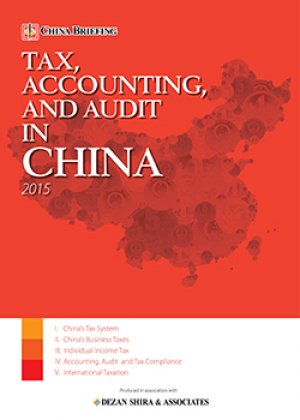Tax Planning for your Pre-incorporation Expenses in China
 By Dezan Shira & Associates
By Dezan Shira & Associates
Legal Editor: Steven Elsinga
When setting up a company in China, one inevitably incurs costs prior to the company being formally incorporated. The question then arises what part of these costs may be deducted from the company’s tax bill. This becomes especially relevant if the investment is a large project, such as setting up a factory and purchasing machinery, where the costs incurred prior to incorporation can be substantial.
At this point, it is important to note that Representative Offices (ROs) are taxed on their expenditure. It is therefore in the investor’s interest to, within reason, keep expenses allocated to the RO to a minimum. For this reason, it is advisable to allocate the RO’s pre-incorporation expenses to the foreign headquarters.
To learn more about the tax liability of ROs, please refer to our business guide Tax, Accounting and Audit in China 2015.
A Foreign Invested Entity (FIE), being an independent legal entity registered in China, is taxed on its income, and may therefore deduct expenses from Chinese tax. As pre-incorporation expenses by definition have been incurred prior to the FIE formally existing, only some of these expenses can be taken on by the FIE.
Of all the expenses made before formal incorporation, only the so-called pre-operation costs (or 开办费) may be allocated to the FIE and deducted. The key point in defining pre-operation costs is when they occurred. In practice, the starting point of this period is seen as either the establishment date on the business license, or the day on which the investor gets the company name confirmation from the Administration for Industry and Commerce (AIC). This is usually one month before the establishment date on the business license.
Most of the costs incurred during this period, such as wages, training, printing, transport fees, registration fees and purchases of items not considered fixed assets, may be deducted if relevant valid tax invoice can be provided. Some of the advertising and business-related entertainment expenses (business dinners, gifts, baijiu, etc.) may be allocated to the FIE, up to 60 percent.
![]() RELATED: Understanding China’s ‘Fapiao’ Invoice System
RELATED: Understanding China’s ‘Fapiao’ Invoice System
It is often hard to predict what the establishment date of the company will be. This largely depends on how the incorporation process is conducted. However, the better the investor manages the incorporation from its side, the more clarity one can hope to get.
Before the company is incorporated, the foreign investor may open a temporary bank account in China. The investor may wire foreign currency into this account and spend these funds on pre-operation and other expenses. After the company has been established, it needs to open a capital account. The funds from the temporary account can then be wired to this account.
In practice, the only cost incurred prior to the pre-incorporation cost period is office rent. Allocation to the FIE is accepted, as an office lease is a required step of the incorporation process.
The ending point of the pre-operation cost period is when the company issues its first invoice, or generates its first revenue.
Especially manufacturing companies, which often have a long pre-operation period, should take careful consideration of when their pre-operation period ends. These companies in particular need to make sure costs incurred can be carried forward as a loss over the next five years.
|
Asia Briefing Ltd. is a subsidiary of Dezan Shira & Associates. Dezan Shira is a specialist foreign direct investment practice, providing corporate establishment, business advisory, tax advisory and compliance, accounting, payroll, due diligence and financial review services to multinationals investing in China, Hong Kong, India, Vietnam, Singapore and the rest of ASEAN. For further information, please email china@dezshira.com or visit www.dezshira.com. Stay up to date with the latest business and investment trends in Asia by subscribing to our complimentary update service featuring news, commentary and regulatory insight. |
![]()
 Tax, Accounting, and Audit in China 2015
Tax, Accounting, and Audit in China 2015
This edition of Tax, Accounting, and Audit in China, updated for 2015, offers a comprehensive overview of the major taxes foreign investors are likely to encounter when establishing or operating a business in China, as well as other tax-relevant obligations. This concise, detailed, yet pragmatic guide is ideal for CFOs, compliance officers and heads of accounting who must navigate the complex tax and accounting landscape in China in order to effectively manage and strategically plan their China operations.
Managing Your Accounting and Bookkeeping in China
In this issue of China Briefing, we discuss the difference between the International Financial Reporting Standards, and the accounting standards mandated by China’s Ministry of Finance. We also pay special attention to the role of foreign currency in accounting, both in remitting funds, and conversion. In an interview with Jenny Liao, Dezan Shira & Associates’ Senior Manager of Corporate Accounting Services in Shanghai, we outline some of the pros and cons of outsourcing one’s accounting function.
 China Investment Roadmap: The Medical Device Industry
China Investment Roadmap: The Medical Device Industry
In this issue of China Briefing, we present a roadmap for investing in China’s medical device industry, from initial market research, to establishing a manufacturing or trading company in China, to obtaining the licenses needed to make or distribute your products. With our specialized knowledge and experience in the medical industry, Dezan Shira & Associates can help you to newly establish or grow your operations in China and beyond.
- Previous Article China Clarifies Tax Treatment of Indirect Asset Transfers
- Next Article Acheter et Imprimer des Fapiao










